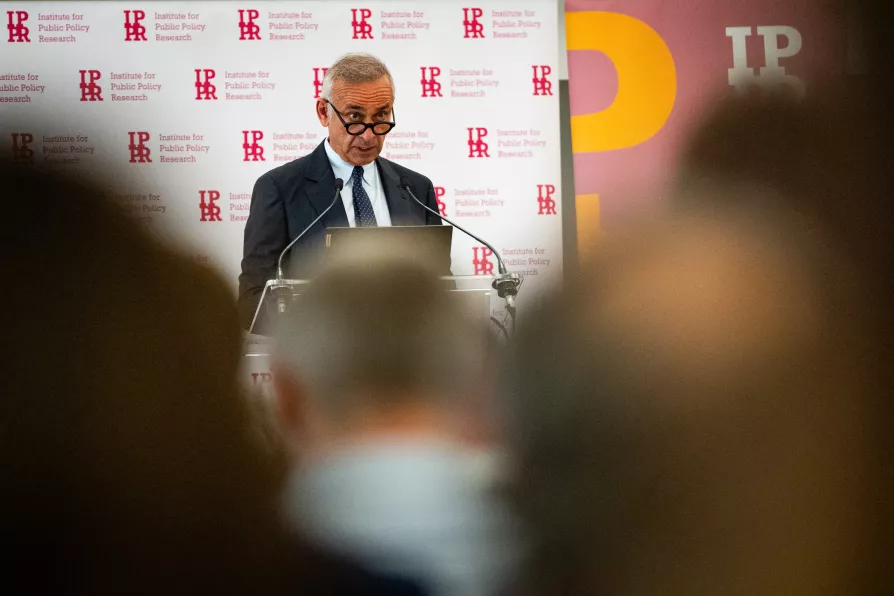As the RMT Health and Safety Conference takes place, the union is calling for urgent action on crisis of work-related stress, understaffing and the growing threat of workplace assaults. RMT leader EDDIE DEMPSEY explains

 Lord Ara Darzi delivers a speech at an Institute for Public Policy event in the Aldersgate Room, Central Hall Westminster, London, September 18, 2024
Lord Ara Darzi delivers a speech at an Institute for Public Policy event in the Aldersgate Room, Central Hall Westminster, London, September 18, 2024
LORD DARZI’S independent investigation of the NHS in England is a double-edged sword. Yes, it is a no-holds-barred look at how the NHS is failing to deliver in line with what the public rightly expects from their health service.
It makes an uncompromising argument that these problems cannot be resolved without ending austerity and refunding the NHS to the level required. Keep our NHS public (KONP) summarised those aspects, which echo other recent analyses of a failing NHS, when Darzi’s report was published on September 11.
At the same time, Darzi rewrites NHS history, omits a key founding principle of the NHS, does not oppose privatisation, is silent on a major current controversy, and sets the stage for Labour’s intended “reforms.” For those reasons, Darzi’s approach is both deficient and dangerous.
The rest of what Darzi did and did not say
Darzi lays the entire blame for the current NHS crisis on coalition and Tory governments since 2010, their political choice to pursue austerity, and the Health and Social Care Act 2012.
NHS austerity began under Labour in 2009 with the “Nicholson challenge,” when the government accepted and implemented the recommendations of the McKinsey Report commissioned by Gordon Brown.
This aimed to save £15-20 billion per year from the NHS Budget by ongoing “provider efficiencies” (work harder for less pay), promoting community services in place of hospitals, and removing some procedures from the NHS (whether or not the public needed them).
So, the coalition and successive Tory governments did not invent this policy; they continued it.
Darzi is silent on the many “reforms” introduced by the Blair government, including health secretary Alan Milburn’s concordat with the private sector for elective treatments, the proliferation of private finance initiative (PFI) hospitals, foundation trusts, choose and book, independent sector treatment centres, personal health budgets, practice-based commissioning, the framework for external support for commissioning (FESC) and more.
Darzi targets the HSCA 2012 but explicitly welcomes the Health and Care Act 2022, which gave legal status to the top-down restructuring imposed by NHS England under Simon Stevens. This stretched from the five-year forward view (2014) through STPS (2016), Accountable Care Organisations (2016), Accountable Care Systems (2017) quickly rebranded — unchanged — as “integrated care systems” (2018), and the NHS Long Term Plan (2019).
US health insurance corporations, including UnitedHealth and big accountancy firms, including Pricewaterhouse Coopers, promoted the project. Many such companies and their subsidiaries were accredited by NHSE on the health systems support framework (HSSF) to develop Integrated Care Systems. The project aligns NHS financing with the US model of “accountable care.” That is why many campaigners call it the “Americanisation” of the NHS.
What about the private sector? Darzi is certainly opposed to replacing the NHS with an insurance model. He writes: “Nothing that I have found draws into question the principles of a health service that is taxpayer-funded, free at the point of use, and based on need not ability to pay.
“With the prominent exception of the US, every advanced country has universal health coverage — and the rest of the world is striving towards it. But other health system models — those where user charges, social or private insurance play a bigger role — are more expensive, even if their funding tends to be more stable. It is not a question, therefore, of whether we can afford the NHS. Rather, we cannot afford not to have the NHS, so it is imperative that we turn the situation around.”
But nothing in Darzi’s quote says that the health service should be publicly provided. Darzi’s version of the principles omits “publicly provided,” as if Bevan had not nationalised private hospitals when founding the NHS.
Darzi appears to think that the NHS Long Term Plan and privatisation are mutually exclusive. He promotes patient choice, then attacks the compulsory clinical tendering in the HSCA 2012, and then writes:
“Yet despite all-but eliminating the role of markets, the NHS is yet to fully embrace the planned alternative. The NHS Long Term Plan was published in 2019, but was quickly superseded by events with the outbreak of the pandemic the following year.”
“All-but-eliminating?” Yes, the HCA 2022 repealed Section 75 (compulsory tendering of clinical services) of the hated HSCA 2012. But it did not remotely eliminate the role of markets.
Reports by the Centre for Health and the Public Interest (CHPI) and the KONP privatisation databases show how the private sector has penetrated the NHS from service provision through to commissioning, a saga running from Blair’s FESC to the HSSF.
Darzi refers to multidisciplinary teams but does not mention physician associates, anaesthesia associates, or surgical care practitioners, whose roles are highly contested, including within his own profession. The great expansion of medical associate professionals is set out in the NHS Workforce Plan and was signalled in the NHS Long Term Plan, which Darzi welcomes.
How Labour responded
When Darzi’s report was published, Keir Starmer immediately made clear that additional funding for the NHS was conditional on acceptance of “reforms” and that he was ready to challenge health unions on this.

When privatisation is already so deeply embedded in the NHS, we can’t just blindly argue for ‘more funding’ to solve its problems, explain ESTHER GILES, NICO CSERGO, BRIAN GIBBONS and RATHI GUHADASAN













